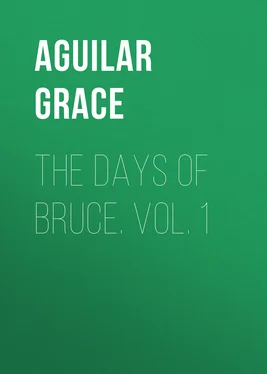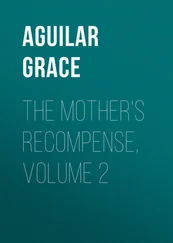Grace Aguilar - The Days of Bruce. Vol. 1
Здесь есть возможность читать онлайн «Grace Aguilar - The Days of Bruce. Vol. 1» — ознакомительный отрывок электронной книги совершенно бесплатно, а после прочтения отрывка купить полную версию. В некоторых случаях можно слушать аудио, скачать через торрент в формате fb2 и присутствует краткое содержание. Жанр: foreign_prose, История, foreign_edu, foreign_antique, на английском языке. Описание произведения, (предисловие) а так же отзывы посетителей доступны на портале библиотеки ЛибКат.
- Название:The Days of Bruce. Vol. 1
- Автор:
- Жанр:
- Год:неизвестен
- ISBN:нет данных
- Рейтинг книги:5 / 5. Голосов: 1
-
Избранное:Добавить в избранное
- Отзывы:
-
Ваша оценка:
- 100
- 1
- 2
- 3
- 4
- 5
The Days of Bruce. Vol. 1: краткое содержание, описание и аннотация
Предлагаем к чтению аннотацию, описание, краткое содержание или предисловие (зависит от того, что написал сам автор книги «The Days of Bruce. Vol. 1»). Если вы не нашли необходимую информацию о книге — напишите в комментариях, мы постараемся отыскать её.
The Days of Bruce. Vol. 1 — читать онлайн ознакомительный отрывок
Ниже представлен текст книги, разбитый по страницам. Система сохранения места последней прочитанной страницы, позволяет с удобством читать онлайн бесплатно книгу «The Days of Bruce. Vol. 1», без необходимости каждый раз заново искать на чём Вы остановились. Поставьте закладку, и сможете в любой момент перейти на страницу, на которой закончили чтение.
Интервал:
Закладка:
"Thou art but a fool, Isabella, craving thy pardon," was his ungracious address, as he sullenly freed himself from her. "Had I brought thee the bull's horns, there might have been some cause for this marvellously warm welcome; but as it is—"
"I joy thou wert not punished for thy rashness, Duncan. Yet 'twas not in such mood I hoped to find thee; knowest thou that 'tis to yon brave stranger thou owest thy life?"
"Better it had been forfeited, than that he should stand between me and mine honor. I thank him not for it, nor owe him aught like gratitude."
"Peace, ungrateful boy, an thou knowest not thy station better," was his sister's calm, yet dignified reply; and the stranger smiled, and by his courteous manner, speedily dismissed her fears as to the impression of her brother's words, regarding them as the mere petulance of a child.
Days passed, and still the stranger lingered; eminently handsome, his carriage peculiarly graceful, and even dignified, although it was evident, from the slight, and as it were, unfinished roundness of his figure, that he was but in the first stage of youth, yet his discourse and manner were of a kind that would bespeak him noble, even had his appearance been less convincing. According to the custom of the time, which would have deemed the questioning a guest as to his name and family a breach of all the rules of chivalry and hospitality, he remained unknown.
"Men call me Sir Robert, though I have still my spurs to win," he had once said, laughingly, to Lady Isabella and her kinsman, Sir Malise Duff, "but I would not proclaim my birth till I may bring it honor."
A month passed ere their guest took his departure, leaving regard and regret behind him, in all, perhaps, save in the childish breast of Earl Duncan, whose sullen manner had never changed. There was a freshness and light-heartedness, and a wild spirit of daring gallantry about the stranger that fascinated, men scarce knew wherefore; a reckless independence of sentiment which charmed, from the utter absence of all affectation which it comprised. To all, save to the Lady Isabella, he was a mere boy, younger even than his years; but in conversation with her his superior mind shone forth, proving he could in truth appreciate hers, and give back intellect for intellect, feeling for feeling; perhaps her beauty and unusual endowments had left their impression upon him. However it may be, one day, one little day after the departure of Sir Robert, Isabella woke to the consciousness that the calm which had so long rested on her spirit bad departed, and forever; and to what had it given place? Had she dared to love, she, the betrothed, the promised bride of another? No; she could not have sunk thus low, her heart had been too long controlled to rebel now. She might not, she would not listen to its voice, to its wild, impassioned throbs. Alas! she miscalculated her own power; the fastnesses she had deemed secure were forced; they closed upon their subtle foe, and held their conqueror prisoner.
But Isabella was not one to waver in a determination when once formed; how might she break asunder links which the dead had hallowed? She became the bride of Lord John; she sought with her whole soul to forget the past, and love him according to her bridal vow, and as time passed she ceased to think of that beautiful vision of her early youth, save as a dream that had had no resting; and a mother's fond yearnings sent their deep delicious sweetness as oil on the troubled waters of her heart. She might have done this, but unhappily she too soon discovered her husband was not one to aid her in her unsuspected task, to soothe and guide, and by his affection demand her gratitude and reverence. Enwrapped in selfishness or haughty indifference, his manner towards her ever harsh, unbending, and suspicious, Isabella's pride would have sustained her, had not her previous trial lowered her in self-esteem; but as it was, meekly and silently she bore with the continued outbreak of unrestrained passion, and never wavered from the path of duty her clear mind had laid down.
On the birth of a son, however, her mind regained its tone, and inwardly yet solemnly she vowed that no mistaken sense of duty to her husband should interfere with the education of her son. As widely opposed as were their individual characters, so were the politics of the now Earl and Countess of Buchan. Educated in England, on friendly terms with her king, he had, as the Earl of Fife anticipated, lost all nationality, all interest in Scotland, and as willingly and unconcernedly taken the vows of homage to John Baliol, as the mere representative and lieutenant of Edward, as he would have done to a free and unlimited king. He had been among the very first to vote for calling in the King of England as umpire; the most eager to second and carry out all Edward's views, and consequently high in that monarch's favor, a reputation which his enmity to the house of Bruce, one of the most troublesome competitors of the crown, did not tend to diminish. Fortunately perhaps for Isabella, the bustling politics of her husband constantly divided them. The births of a daughter and son had no effect in softening his hard and selfish temper; he looked on them more as incumbrances than pleasures, and leaving the countess in the strong Tower of Buchan, he himself, with a troop of armed and mounted Comyns, attached himself to the court and interests of Edward, seeming to forget that such beings as a wife and children had existence. Months, often years, would stretch between the earl's visits to his mountain home, and then a week was the longest period of his lingering; but no evidence of a gentler spirit or of less indifference to his children was apparent, and years seemed to have turned to positive evil, qualities which in youth had merely seemed unamiable.
Desolate as the situation of the countess might perhaps appear, she found solace and delight in moulding the young minds of her children according to the pure and elevated cast of her own. All the long-suppressed tenderness of her nature was lavished upon them, and on their innocent love she sought to rest the passionate yearnings of her own. She taught them to be patriots, in the purest, most beautiful appropriation of the term,—to spurn the yoke of the foreigner, and the oppressor, however light and flowery the links of that yoke might seem. She could not bid them love and revere their father as she longed to do, but she taught them that where their duty to their country and their free and unchained king interfered not, in all things they must obey and serve their father, and seek to win his love.
Once only had the Countess of Buchan beheld the vision which had crossed her youth. He had come, it seemed unconscious of his track, and asked hospitality for a night, evidently without knowing who was the owner of the castle; perhaps his thoughts were preoccupied, for a deep gloom was on his brow, and though he had started with evident pleasure when recognizing his beautiful hostess, the gloom speedily resumed ascendency. It was but a few weeks after the fatal battle of Falkirk, and therefore Isabella felt there was cause enough for depression and uneasiness. The graces of boyhood had given place to a finished manliness of deportment, a calmer expression of feature, denoting that years had changed and steadied the character, even as the form. He then seemed as one laboring under painful and heavy thought, as one brooding over some mighty change within, as if some question of weighty import were struggling with recollections and visions of the past. He had spoken little, evidently shrinking in pain from all reference to or information on the late engagement. He tarried not long, departing with dawn next day, and they did not meet again.
And what had been the emotions of the countess? perhaps her heart had throbbed, and her cheek paled and flushed, at this unexpected meeting with one she had fervently prayed never to see again; but not one feeling obtained ascendency in that heart which she would have dreaded to unveil to the eye of her husband. She did indeed feel that had her lot been cast otherwise, it must have been a happy one, but the thought was transient. She was a wife, a mother, and in the happiness of her children, her youth, and all its joys and pangs, and dreams and hopes, were merged, to be recalled no more.
Читать дальшеИнтервал:
Закладка:
Похожие книги на «The Days of Bruce. Vol. 1»
Представляем Вашему вниманию похожие книги на «The Days of Bruce. Vol. 1» списком для выбора. Мы отобрали схожую по названию и смыслу литературу в надежде предоставить читателям больше вариантов отыскать новые, интересные, ещё непрочитанные произведения.
Обсуждение, отзывы о книге «The Days of Bruce. Vol. 1» и просто собственные мнения читателей. Оставьте ваши комментарии, напишите, что Вы думаете о произведении, его смысле или главных героях. Укажите что конкретно понравилось, а что нет, и почему Вы так считаете.












